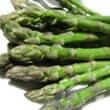Background
- In its wild form in Ancient Greece and Rome, asparagus was used as a diuretic (increasing urine flow) to flush out the kidneys and prevent the formation of kidney stones. In Asian medicine, asparagus root is given for cough, diarrhea, and nervous problems. Asparagus roots and leaves are used in Ayurvedic medicine for female infertility.
- Today, asparagus is most often used as a food. There is very limited research in human on the medicinal uses of asparagus.
References
- Goyal RK, Singh J, Lal H. Asparagus racemosus--an update. Indian J Med Sci 2003;57(9):408-414.
View Abstract - Rieker J, Ruzicka T, Neumann NJ, et al. [Type I and type IV sensitization to Asparagus officinalis]. Hautarzt 2004;55(4):397-398.
View Abstract - Sharma S, Ramji S, Kumari S, et al. Randomized controlled trial of Asparagus racemosus (Shatavari) as a lactogogue in lactational inadequacy. Indian Pediatr 1996;33(8):675-677.
View Abstract - Tabar AI, Alvarez-Puebla MJ, Gomez B, et al. Diversity of asparagus allergy: clinical and immunological features. Clin Exp Allergy 2004;34(1):131-136.
View Abstract - Wiboonpun N, Phuwapraisirisan P, Tip-pyang S. Identification of antioxidant compound from Asparagus racemosus. Phytother Res 2004;18(9):771-773.
View Abstract - Yang CX, Huang SS, Yang XP, et al. Nor-lignans and steroidal saponins from Asparagus gobicus. Planta Med 2004;70(5):446-451.
View Abstract







